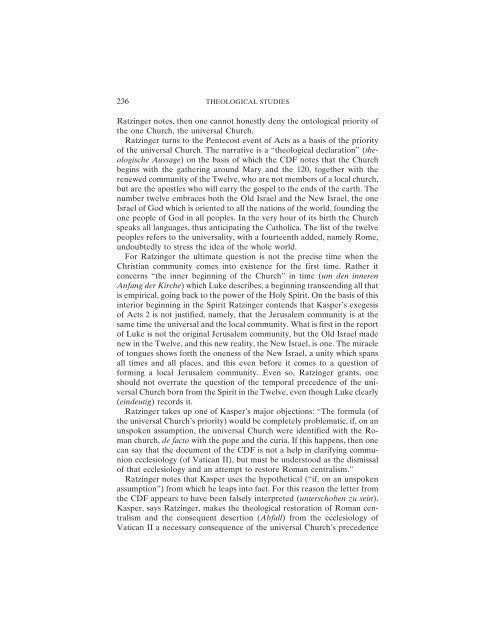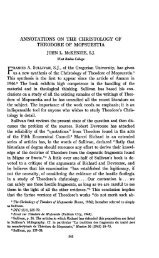the ratzinger/kasper debate - Theological Studies
the ratzinger/kasper debate - Theological Studies
the ratzinger/kasper debate - Theological Studies
You also want an ePaper? Increase the reach of your titles
YUMPU automatically turns print PDFs into web optimized ePapers that Google loves.
236 THEOLOGICAL STUDIES<br />
Ratzinger notes, <strong>the</strong>n one cannot honestly deny <strong>the</strong> ontological priority of<br />
<strong>the</strong> one Church, <strong>the</strong> universal Church.<br />
Ratzinger turns to <strong>the</strong> Pentecost event of Acts as a basis of <strong>the</strong> priority<br />
of <strong>the</strong> universal Church. The narrative is a “<strong>the</strong>ological declaration” (<strong>the</strong>ologische<br />
Aussage) on <strong>the</strong> basis of which <strong>the</strong> CDF notes that <strong>the</strong> Church<br />
begins with <strong>the</strong> ga<strong>the</strong>ring around Mary and <strong>the</strong> 120, toge<strong>the</strong>r with <strong>the</strong><br />
renewed community of <strong>the</strong> Twelve, who are not members of a local church,<br />
but are <strong>the</strong> apostles who will carry <strong>the</strong> gospel to <strong>the</strong> ends of <strong>the</strong> earth. The<br />
number twelve embraces both <strong>the</strong> Old Israel and <strong>the</strong> New Israel, <strong>the</strong> one<br />
Israel of God which is oriented to all <strong>the</strong> nations of <strong>the</strong> world, founding <strong>the</strong><br />
one people of God in all peoples. In <strong>the</strong> very hour of its birth <strong>the</strong> Church<br />
speaks all languages, thus anticipating <strong>the</strong> Catholica. The list of <strong>the</strong> twelve<br />
peoples refers to <strong>the</strong> universality, with a fourteenth added, namely Rome,<br />
undoubtedly to stress <strong>the</strong> idea of <strong>the</strong> whole world.<br />
For Ratzinger <strong>the</strong> ultimate question is not <strong>the</strong> precise time when <strong>the</strong><br />
Christian community comes into existence for <strong>the</strong> first time. Ra<strong>the</strong>r it<br />
concerns “<strong>the</strong> inner beginning of <strong>the</strong> Church” in time (um den inneren<br />
Anfang der Kirche) which Luke describes, a beginning transcending all that<br />
is empirical, going back to <strong>the</strong> power of <strong>the</strong> Holy Spirit. On <strong>the</strong> basis of this<br />
interior beginning in <strong>the</strong> Spirit Ratzinger contends that Kasper’s exegesis<br />
of Acts 2 is not justified, namely, that <strong>the</strong> Jerusalem community is at <strong>the</strong><br />
same time <strong>the</strong> universal and <strong>the</strong> local community. What is first in <strong>the</strong> report<br />
of Luke is not <strong>the</strong> original Jerusalem community, but <strong>the</strong> Old Israel made<br />
new in <strong>the</strong> Twelve, and this new reality, <strong>the</strong> New Israel, is one. The miracle<br />
of tongues shows forth <strong>the</strong> oneness of <strong>the</strong> New Israel, a unity which spans<br />
all times and all places, and this even before it comes to a question of<br />
forming a local Jerusalem community. Even so, Ratzinger grants, one<br />
should not overrate <strong>the</strong> question of <strong>the</strong> temporal precedence of <strong>the</strong> universal<br />
Church born from <strong>the</strong> Spirit in <strong>the</strong> Twelve, even though Luke clearly<br />
(eindeutig) records it.<br />
Ratzinger takes up one of Kasper’s major objections: “The formula (of<br />
<strong>the</strong> universal Church’s priority) would be completely problematic, if, on an<br />
unspoken assumption, <strong>the</strong> universal Church were identified with <strong>the</strong> Roman<br />
church, de facto with <strong>the</strong> pope and <strong>the</strong> curia. If this happens, <strong>the</strong>n one<br />
can say that <strong>the</strong> document of <strong>the</strong> CDF is not a help in clarifying communion<br />
ecclesiology (of Vatican II), but must be understood as <strong>the</strong> dismissal<br />
of that ecclesiology and an attempt to restore Roman centralism.”<br />
Ratzinger notes that Kasper uses <strong>the</strong> hypo<strong>the</strong>tical (“if, on an unspoken<br />
assumption”) from which he leaps into fact. For this reason <strong>the</strong> letter from<br />
<strong>the</strong> CDF appears to have been falsely interpreted (unterschoben zu sein).<br />
Kasper, says Ratzinger, makes <strong>the</strong> <strong>the</strong>ological restoration of Roman centralism<br />
and <strong>the</strong> consequent desertion (Abfall) from <strong>the</strong> ecclesiology of<br />
Vatican II a necessary consequence of <strong>the</strong> universal Church’s precedence

















